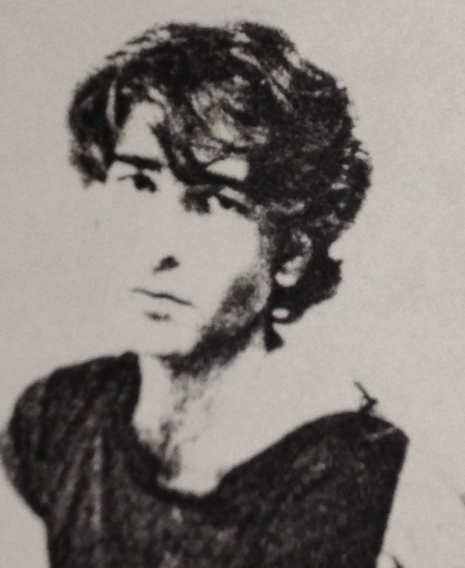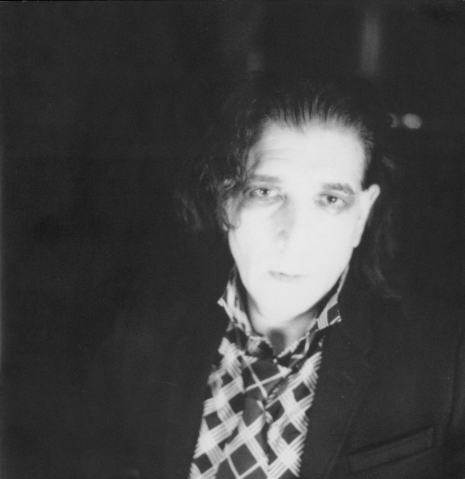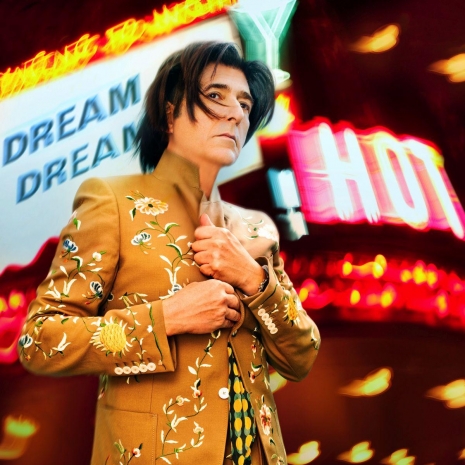
It’s taken a long time, but Jason Sniderman has finally let the world hear glam rocker Ensign Broderick. The Toronto musician created the Broderick persona in the early ‘70s, around the time he started writing songs. He recorded these compositions in his bedroom, rarely playing them for anyone. Sniderman has been in bands—including punky new wave outfit, Blue Peter—and worked as a session musician, all the while leaving his Ensign Broderick recordings to gather dust.
But that’s all changed. Six Shooter Records released Ensign Broderick’s debut, Feast of Panthers, a few months ago, and two new albums, Beauty nor Ashes and Ranger, just came out. His next one, Only Love Remains, is due out on June 15th. There’s an abundance of strong material on the records, which feature glam tracks, new romantic-style synth-pop, string-enriched ballads, and straight-up rockers. His baritone is reminiscent of David Bowie, Scott Walker, Nick Cave, and, notably, Bryan Ferry, but has its own distinct flavor.

The Ensign Broderick albums largely consist of recent recordings, though elements from the original tapes were used. Take the funky glam-soul number, “True Shame,” in which his ‘70s vocal, sax, and guitar parts were all incorporated into the mix.
Dangerous Minds recently interviewed Ensign Broderick via email.
When did you start writing songs?
Ensign Broderick: I started writing songs when I was ten or eleven. I had been taking classical piano lessons at the Royal Conservatory of Music when I was three (tagging along with my brother), but I did not enjoy many aspects of what I was being taught. I really wanted to be a drummer, so to encourage me to practice piano my parents appeased me by buying me a drum kit, piece by piece. E.g. snare drum at Christmas, a cymbal for my next birthday, a bass drum for my next birthday etc. By the time I was seven I had acquired a full kit (which I still have). I practiced drums a lot. Three to four hours per day. Playing along to full sides of the first Jimi Hendrix record, Led Zeppelin, the Who’s Live at Leeds and Who’s Next, and stuff like that. Along the line (at nine or ten), I discovered Little Richard and Jerry Lee Lewis. And then Nicky Hopkins and Leon Russell and Elton John, and realized that piano playing and players were ok too. I also started to play Chopin at piano lessons, and I recognized harmonic structures in serious music, which I could relate to rock and roll. Listening to those players, and having a better understanding of classical music, gave me the inspiration to write songs.
What sort of recording equipment did you use, back in the day?
Ensign Broderick: A cassette deck and sometimes a reel-to-reel. I would bounce tracks so that some of the bedroom recordings would have close to twelve tracks, but really reduced fidelity. All vocals were done through either a Fender Quad or a Tapco mixer.
How did you come to share your archival material with Six Shooter?
Ensign Broderick: I was far too shy to share my stuff with anyone. Very few people had heard it. Even the people who played on it rarely heard finished versions.
I had my stuff on a Soundcloud that I was keeping to myself and Shauna de Cartier (Six Shooter Records) discovered it on her own.
What periods of songwriting did you draw from to record for your new albums?
Ensign Broderick: From 1971 to the present day. It’s all interspersed. On Ranger, the song “The Bedrooms of My Youth” was written in 2011, even though it is about the time period when I first formed a musical identity of my own. The song “Blinded by My Own Mascara” was written in 1972.

Have any of your original demos been released on vinyl?
Ensign Broderick: There is one demo released and it is hidden on vinyl.
A new Guy Maddin short revolves around one of your songs. How did that come about?
Ensign Broderick: I’m a huge Guy Maddin fan. I think that his films are classics and in retrospect he will be recognized for the true genius he is. Plus he knows who Tennessee Tuxedo is, also Mr. Wizard. I was watching The Forbidden Room and was once again totally amazed at Guy’s use and filming of snow. Just about the most beautiful thing ever. Certainly in line with Kurosawa. The most recent use that approximates Guy’s understanding is maybe the cherry blossom dream scene from The Cell. But Guy is the best. Shauna asked him if he’d consider helping us, and he asked us to send the music. He, Evan [Johnson] and Galen [Johnson] listened to it all and decided on the song “Accidence.” I trusted them to come up with something amazing, and of course they did. Eye-shattering. And I thought he’d introduce me to Charlotte Rampling. Evan and Galen know more about music then most of the people I know. With them I have few references to hide behind. Their use of Brahms’s first symphony in The Forbidden Room is amazing. I also think they are secret Wagner fans and that always reminds me of Un Chien Andalou, so that is twice as awesome.
What’s your live show like?
Ensign Broderick: Live show is a work in progress. When I write I try to ensure that the songs can be played, at the very least, as solo pieces with piano. I mean a song like “GlitterGun” or “True Shame” doesn’t work that way necessarily, but I also like to reinterpret things all the time. The music and the songs should have some plasticity and be malleable enough to be played in different ways, depending on the scenario. When I was kid, I was always amazed at how jazz players reinterpreted the classic songbook. Parker doing “My Favorite Things” or Chet Baker doing “My Funny Valentine.” I loved Earl Hines and Errol Garner and Horace Silver. And the way that Jacques Loussier could turn Bach into swing. Willie Smith, Teddy Wilson, Art Tatum. These guys played with such fluidity and inventiveness that a song was reduced to its elements. I strive to make my music and to have my harmonic structures have a strong enough foundation to be repurposed in many ways. That too is a work in progress that I apply myself to everyday. I may never get there, but I am always trying to temper my stuff so that it doesn’t become ephemera or kitsch.
What’s next for you? Is there another album in the works?
Ensign Broderick: There is a new album in two parts that is finished, which I recorded with Malcolm Burn. And I am in the middle of recording another whole record with David Bottrill. Halfway done. And I am going to record another entire album of orchestral songs (with Jonathan Goldsmith) this fall or early winter.

I also asked Ensign if he would share his thoughts on a handful of specific tracks.
“Roomful of Flowers”
Ensign Broderick: This was written in 1982-83. I was thinking about Diana Ross being glamorous and singing “Love Hangover.” Maybe a bit of Boz Scaggs. But also Lil Wayne. On the remake of this song, “Only Love Is the Answer,” Chris Wardman plays an amazing solo. Kind of Earl Slick meets Jimmy Page meets Adrian Belew.
“Blinded by My Own Mascara”
Ensign Broderick: This was written in 1972. I rewrote some of the words but not much. This is also pretty quintessential. The changes are classically derived. The instrumental middle part would have been something I wrote as a kid, for sure. The rest of the song is so me circa 1972. The Milk Bar was the coolest club in Toronto. And everyone was into Burgess. I watched from the outside.
“Accidence PSA”
Ensign Broderick: This is a voluntary deconstruction of the song “Accidence.” I thought “Accidence” (from Beauty nor Ashes) would be a sweet lullaby to end the record with, but at the last moment decided to switch it with “PSA” version. I think the incredible soundscapes created by Cos Sylvan make the song what it is. Very Swarmatron. It sounds like church bells. The original is kind of a convoluted form of lieder (at least to me) with orchestration. And then I was thinking of Snow White and Cinderella and it goes on from there. There is also a bluegrass version called “Campfire Tale,” which to me brought up the vision that Guy Peelaert created of Hank Williams. Or maybe a bunch of skeleton cowboys sitting around a campfire. Or the strange cowboy in Mulholland Drive. When I was kid I was fascinated with the image of Hopalong Cassidy.
“Rough Bells”
Ensign Broderick: This song is an archival track and the architecture of it was recorded in 1976 and 1977. The original bass and drums and there in some ghostly way even though we re-recorded new bass (Brian Kobayakawa) and drums. It was difficult to deal with leakage coming from the original vocal and sax parts, which were used in their entirety so there are a few overlaps. I was pretty clear about what I wanted the bass to be in ’76 and ‘77. More often than not I will play the bass part in my left hand while I’m writing. That is usually the starting point to most songs. Arthur Jelilyan played the original bass. I think this song is pretty close to what I am musically in a lot of respects.
*****
Taken from his upcoming album, Only Love Remains, here’s the premiere of “Rough Bells”:
Only Love Remains isn’t available for pre-order just yet, but you can pick up Ensign’s other three releases through Six Shooter’s online store or Amazon.
We’ll leave you with a clip from the making-of documentary for Accidence.